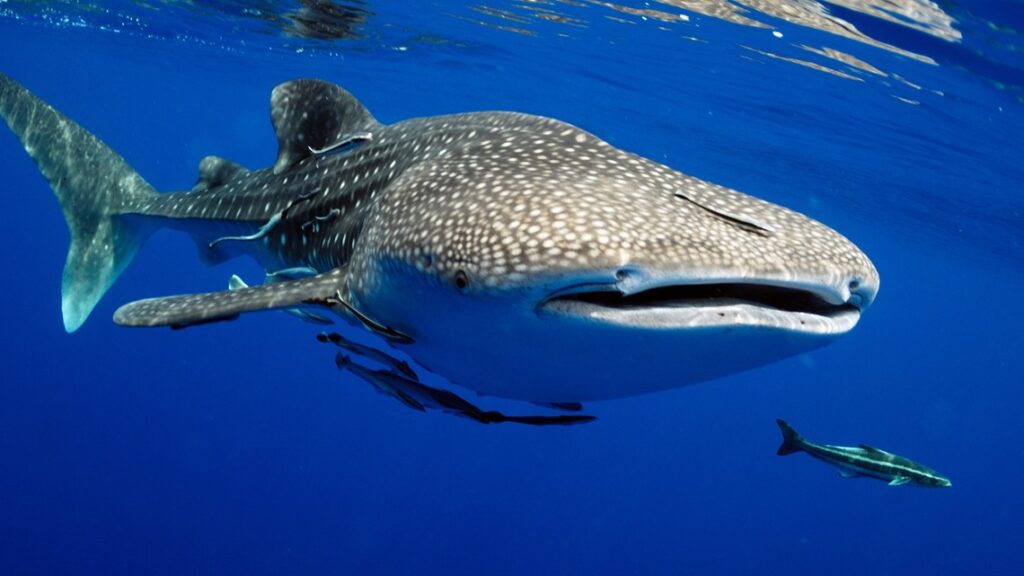

Whale sharks are majestic and gentle giants of the ocean. As the largest fish species in the world, reaching lengths over 40 feet, they are a major draw for marine tourism. However, the rise of irresponsible whale shark tourism practices is causing serious harm. Feeding, crowding, and disruption of migration patterns is negatively impacting whale sharks, which are listed as Endangered on the IUCN Red List.
I have always been amazed about the whale sharks, the gentle and graceful giants of our oceans. As many travelers I wanted to encounter a whale shark once in my life and I did. I was excited to see the animal for the first time in my life. It was in SE Asia while travelling where I was approached by a man offering whale shark sightings and swimming. My eyes became all big and sparky at that moment. In my “little perfect world” I imagined a small group going with a boat to an open ocean and looking for the whale sharks to spot them.
If we are lucky to see them we might go and snorkel with them as well. As the day came the reality hit and the experience became one of the most heartbreaking ones in my life.
A mass of people were gathering for a briefing on how to responsibly interact with whale sharks. We were told to only observe and stay at least 4 meters away from them. As we went to the shore around 15 small boats were waiting for us. Every boat could take 5 people only. I was confused how we going to be safe in those small boats in the open ocean far from the shore.
Well we didn’t go far, we were only 20 m away from the shore when the boat stopped. We were told to go in the water when some men started throwing shrimps into it. All 15 boats were very close together when 6 whale sharks came to feed on the shrimp. Once everybody was in the water (45 people at least) the chaos began. There was no space to observe them from a 4m distance as we and the whale sharks were crowded in a small area.
They gave us 20 minutes of time with them – after that a new group of the same amount of people will enter the water with them. This is going to be all day long, 7 days a week, 365 days per year. I felt horrible seeing people touching the animals all the time, even if you wanted to prevent physical contact it was not possible due to the small crowded area. I was one of the first ones climbing back on the boat because I didn’t want to participate in that horrible chaos and stressing the animals out.
I felt irresponsible to participate in the activity and not inform myself prior to it. Afterwards I did some research about the activities that I participate in as a traveler to avoid being a part of a negative impact to any of our beautiful animals on this planet. I had the chance to encounter whale sharks quite a few times under water while diving. They were there in their natural behavior and as it was an unexpected encounter it made the experience harmless to the animal, positive and unforgettable for me.
Unfortunately whale shark tourism is increasing every year because of the increased demand. Let me explain how these irresponsible interactions have a negative effect on whale sharks as they already are in decline.
Whale sharks normally follow nutrient-rich plankton blooms over long migrations. However, feeding by tour operators is changing their natural behavior. Whale sharks remain in feeding areas instead of migrating [1]. This affects breeding, as the sharks are prevented from reaching mating and pupping grounds [2].
The feeding teaches whale sharks to associate boats and humans with food. They actively approach boats, instead of avoiding them. This risky behavior could lead to boat strikes and injuries outside of protected areas, where fishing vessels may mistake them for prey [3].

Crowding dozens of people and boats into a small area with whale sharks causes chaos. There is unavoidable physical contact, despite guidelines to keep 4m distance [4]. The surrounding crowds increase stress levels and disrupt natural behavior [5].
Boat strikes and propeller injuries are common, as the sharks spend more time at surface approaching vessels. Human bacteria and pathogens transferred by contact also pose an infection risk to the sharks [6].
Whale sharks normally feed on dense plankton patches during migration. But artificial feeding provides limited nutrition from bait fish or krill [7]. This may lead to poor health over time.
The sharks also waste energy chasing feeding boats, instead of naturally foraging [8]. And remaining in one area affects ecosystem balance, as whale sharks are not performing their role in nutrient transport across oceans [9].
The solution is transitioning to responsible whale shark tourism. Practices should minimize environmental impact and disruption of natural behaviors [10]. Ethical guidelines include:
We all desire memorable wildlife encounters. But our actions should not come at the expense of the animals. As consumers, we can drive change by avoiding unethical tour operators worldwide. Choosing responsible, sustainable whale shark tours is the solution.

